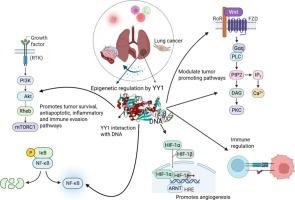阴阳1 (YY1)在肺癌微环境、信号通路和表观遗传学中的作用
IF 9.7
1区 医学
Q1 BIOCHEMISTRY & MOLECULAR BIOLOGY
Biochimica et biophysica acta. Reviews on cancer
Pub Date : 2025-05-30
DOI:10.1016/j.bbcan.2025.189359
引用次数: 0
摘要
肺癌是世界范围内的一个重大健康问题。它是由吸烟和接触致癌物引起的,尽管遗传、表观遗传和转录因子等其他因素也起作用。阴阳1 (YY1)是一种转录因子,在多种癌症的细胞功能调节中具有多方面的作用。它在肺癌的进展中起着至关重要的作用,但也具有肿瘤抑制活性。YY1通过DNA甲基化、组蛋白改变和非编码rna调控表观遗传变化。在肺癌中,YY1过表达并参与转移机制,包括上皮和间质转移(EMT)、侵袭、迁移和血管生成。这些转移特性受到多种信号通路(PI3K-Akt-mTOR、RAF-MEK-ERK、JAK-STAT和Wnt-β-catenin)通过PD-L1表达、自噬和药物不敏感的影响。本文综述了YY1在肺癌进展中的最新研究进展及其对致癌途径、免疫调节和临床意义的影响。此外,本文还对YY1作为生物标志物和靶向分子在肺癌中的应用进行了综述。本文章由计算机程序翻译,如有差异,请以英文原文为准。

Role of Yin Yang 1 (YY1) on microenvironment, signaling pathways, and epigenetics in lung cancer
Lung cancer is a significant health concern worldwide. It is caused by smoking and exposure to carcinogens, although other factors like genetics, epigenetics, and transcription factors also play a role. Yin Yang 1 (YY1) is a transcription factor with a multifaceted role in regulating cellular functions in various cancers. It has a vital role in lung cancer progression, but also has tumor-suppressing activity. YY1 regulates epigenetic changes through DNA methylation, histone alteration, and non-coding RNAs. In lung cancer, YY1 is overexpressed and involved in metastatic mechanisms, including epithelial and mesenchymal transition (EMT), invasion, migration, and angiogenesis. These metastatic properties are influenced by various signaling pathways (PI3K-Akt-mTOR, RAF-MEK-ERK, JAK-STAT, and Wnt-β-catenin) through PD-L1 expression, autophagy, and drug insensitivity. The current review recapitulates the recent advances on YY1 research in lung cancer progression and its influence on oncogenic pathways, immune regulation, and clinical significance. Furthermore, this review also discusses using YY1 as a biomarker and targeted molecule in lung cancer.
求助全文
通过发布文献求助,成功后即可免费获取论文全文。
去求助
来源期刊

Biochimica et biophysica acta. Reviews on cancer
医学-生化与分子生物学
CiteScore
17.20
自引率
0.00%
发文量
138
审稿时长
33 days
期刊介绍:
Biochimica et Biophysica Acta (BBA) - Reviews on Cancer encompasses the entirety of cancer biology and biochemistry, emphasizing oncogenes and tumor suppressor genes, growth-related cell cycle control signaling, carcinogenesis mechanisms, cell transformation, immunologic control mechanisms, genetics of human (mammalian) cancer, control of cell proliferation, genetic and molecular control of organismic development, rational anti-tumor drug design. It publishes mini-reviews and full reviews.
 求助内容:
求助内容: 应助结果提醒方式:
应助结果提醒方式:


